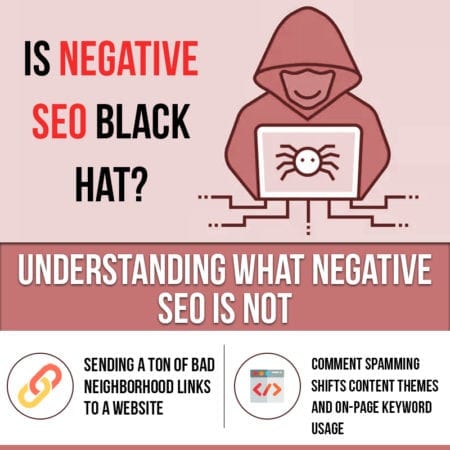 Negative SEO is defined as any tactic whose intention is to positively impact rankings by manipulating a variable within a website’s links, content or user signals. Google says this isn’t real, but they’re not being entirely honest here because if you can accidentally hurt your rankings by shifting a variable, it only makes sense that an external entity shifting that same variable could either decrease or deindex your listing.
Negative SEO is defined as any tactic whose intention is to positively impact rankings by manipulating a variable within a website’s links, content or user signals. Google says this isn’t real, but they’re not being entirely honest here because if you can accidentally hurt your rankings by shifting a variable, it only makes sense that an external entity shifting that same variable could either decrease or deindex your listing.
Is Negative SEO Black hat?
According to Google, almost all tactics that fall into this category are a form of black hat SEO. This is different from “white hat,” which follows the search engines’ written terms of service (TOS). Black hat operates based on experience instead. So, if the TOS stated that you shouldn’t buy links, white hat would never buy any links, but black hat would do so if it was an effective strategy for their website. Of course, there’s some wiggle room here, but there are some tactics that are definitely black hat in nature like cloaking.
Is Negative SEO Hacking?
While they definitely share certain characteristics in common, they’re not one and the same thing. According to the Merriam-Webster dictionary, a hacker is a person who illegally gains access to and sometimes tampers with a computer system’s information. Since this changes how your site looks or operates, or gives you unauthorized access it’s considered hacking. In some countries a stricter approach to this is taken while other countries have a more laissez-faire attitude about it.
What are Some of the Best-Known SEO Techniques Here?
There are some well-known negative SEO techniques today. These include:
- Sending a ton of bad neighborhood links to a website isn’t hacking, but it can still do a lot of harm to that website’s SEO. This is because these sites that are part of “an outed network” eventually turn into “a burned network.” These sites are assessed for a manual penalty and any sites receiving traffic from them will also be penalized.
- Comment spamming shifts content themes and on-page keyword usage. It’s a form of “keyword stuffing” that changes the look and feel of a website even though it doesn’t inject content into a website. Some people still consider it a form of hacking, especially if it’s done on a large, automated scale.
- Indexing URLs with bad content that’s created by bad content entered into your content management system (CMS) is hacking. However, if Google is simply finding it difficult to read your CMS or misunderstand what it’s reading, this isn’t considered hacking.
- Hotlinking your competitor’s biggest images so you can use up their bandwidth, trigger a bandwidth exceeded issue or otherwise slow down their website is another form of negative SEO. Some people don’t think of this as a form of hacking but if it’s done with a malicious intent, then you may find some people who consider it hacking.
- Inserting random distributed reflective denial-of-service attacks is definitely a form of hacking, even though it is more of a takedown.
Clearly, you can see it’s all in how you look at these things whether they’re a form of hacking or not. Nevertheless, these are all types of negative SEO.
Is This SEO Legal?
This is something that a lot of people want to know. Since this form of extortion isn’t new and appears to be closely related to hacking, it probably isn’t “illegal” in the strictest sense of that word’s meaning. Nevertheless, it’s not right and it’s definitely something you should avoid. Here at Affordable SEO Company we avoid negative SEO and still get you high rankings in the SERPs. This is something we’ve done for many customers for many years now. Contact us now so we can start helping you too.
